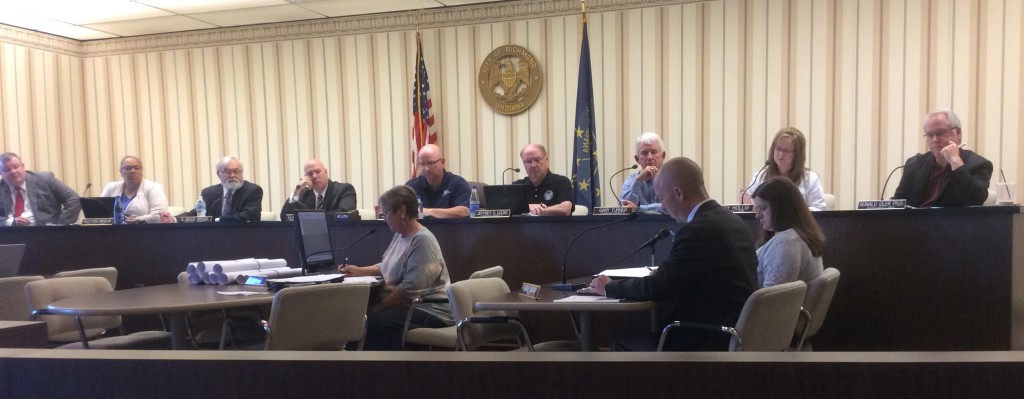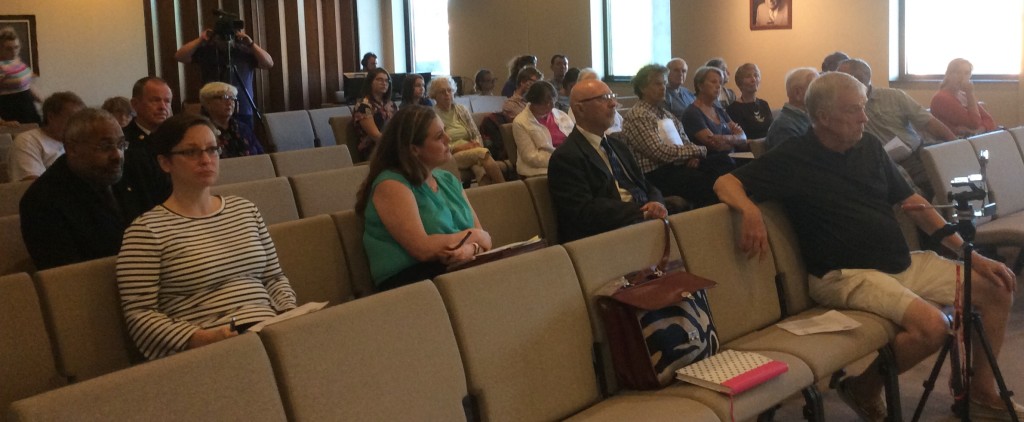Solar power proponents pack Richmond council chambers
RICHMOND, Ind. — At most Richmond Common Council meetings, the sparse audience is made up almost entirely of city department heads and other employees.
But this week, nearly all of the seats in the chambers were filled as proponents of solar power turned out to urge council members not to do away with the city's rules regarding net metering.
A proposed ordinance in front of council would make changes to how Richmond Power & Light handles those customers who use solar panels to generate more power than they need to use themselves.
Under the current rules adopted in November 2010, customers who generate excess power are given a one-to-one credit for each kilowatt hour produced more than what they need for their own homes.
That ordinance sets a cap on the number of kilowatt hours that can be produced under the net metering program, effectively creating a limit of 16-20 homes that could take advantage of the situation.
The proposed ordinance would line up RP&L with the rules used by the Indiana Municipal Power Agency, of which RP&L is a member.
Under those guidelines, customers would be reimbursed in cash by IMPA for those excess kilowatt hours at a wholesale rate plus 25 percent instead of the current higher retail rate.
IMPA's plan also doesn't put any limitations on the number of customers that can be part of the program.
But it's the change in the rate of reimbursement that was a main reason that motivated many of the folks to turn out Monday night. They say the new rate would change the math for deciding whether to install solar panels at someone's home.
"I understand that they're not trying to discourage solar, but unfortunately, it's a side effect of this that it is very discouraging to homeowners because there are pretty exact calculations on how you get a return on investment on solar installations and that includes net metering. So you're leaving it for more wealthy people to be able to install if you have things like this in place," said Alison Zajdel, a former executive director of Cope Environmental Center and the current chair of the city's Environmental Sustainability Commission.
"I know this community is concerned about the environment. We all drink the same water. We all breathe the same air. We want a healthy environment. I think this ordinance makes a statement, and it's the wrong statement."
In the time since the city's net metering program was put into effect, only one customer has signed up to be part of the program, but there are reasons for that that go beyond any possible lack of interest in solar power generation, according to those who spoke to council Monday night.
"Eight years ago, solar panels were prohibitively expensive for any but the most wealthy users," said Caleb Smith, an employee of the Richmond Parks and Recreation Department who was speaking as a private citizen.
"As costs have begun to decrease along with the advantages of net metering, solar has become financially feasible for more individuals."
Council member Ron Oler pushed back on that line of thinking, suggesting the current rules actually favor the more wealthy when it comes to installing solar panels.
"It seems to me if we don't do this, only the first 16 to 20, only the wealthiest will be able to afford this and everyone else will be excluded," he said.
"So we need to do something. It may not be like this, but if we do nothing, ... we're actually hurting the middle to other classes."
Among those who spoke against the proposed ordinance was Laura Ann Arnold, an Indianapolis resident who serves as president of a group called the Indiana Distributed Energy Alliance. She argued IMPA's rules are written to favor the agency's own plans for solar power, such as the new installation being built at the former New Creations property of Richmond's far-east side.
"IMPA is not necessarily anti-solar, but they're anti-individual solar ownership, and that is very clear in all of their policies," Arnold said.
"I believe in energy freedom. I believe in customers having the right to choose and to take personal responsibility for those own consumption and for their own energy futures."
Proponents of the rule changes have said the lower reimbursement rates are similar to what any other power generator would receive when selling their electricity on the open market.
They also argue that solar customers who generate all of their own power don't then share the costs for maintaining the entire electrical grid.
"The argument is if people fall off of the grid by doing their own solar, the cost to maintain the grid kind of shifts from the haves to the have-nots in terms of solar," RP&L General Manager Randy Baker said.
In the end, council decided to hold the ordinance instead of moving it ahead for a final vote. At the earliest that won't come until the July 2 meeting because four members of the council will miss the group's next meeting on June 18.
The move also will allow the city's Environmental Sustainability Commission to discuss the ordinance and make any recommendations it might have for council.
"We think that's the best path moving forward. It allows us to digest what we've heard here tonight and do some further research," Council President Jamie Lopeman said.
Jason Truitt is the team leader and senior reporter at the Palladium-Item. Contact him at (765) 973-4459 or jtruitt@pal-item.com.
photos by Laura Ann Arnold





